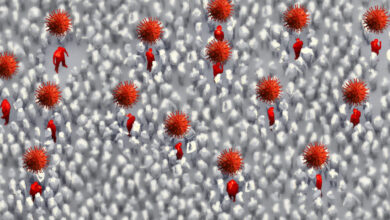Meditation training reduces long-term stress, according to hair analysis


Psychological coaching that promotes abilities akin to mindfulness, gratitude or compassion reduces the focus of the stress hormone cortisol in hair. That is what scientists from the Max Planck Institute for Human Cognitive and Mind Sciences in Leipzig and the Social Neuroscience Analysis Group of the Max Planck Society in Berlin have came upon. The quantity of cortisol in hair supplies details about how a lot an individual is burdened by persistent stress. Earlier constructive coaching results had been proven in acutely traumatic conditions or on particular person days—or had been primarily based on research individuals’ self-reports.
Based on a research by the Techniker Krankenkasse, 23 p.c of individuals in Germany incessantly endure from stress. This situation not solely places a pressure on the well-being of these affected, however it’s also linked to quite a lot of physiological illnesses, together with diabetes, cardiovascular illnesses and psychological problems akin to melancholy, one of many world’s main causes of illness burden (International Burden of Illness Research, 2017).
Subsequently, efficient strategies are being sought to scale back on a regular basis stress in the long run. One promising choice is mindfulness coaching, during which individuals prepare their cognitive and social abilities, together with consideration, gratitude and compassion, by way of numerous meditation and behavioral workout routines. Varied research have already proven that even wholesome folks really feel much less confused after a typical eight-week coaching program. Till now, nonetheless, it has been unclear how a lot the coaching really contributes to decreasing the fixed burden of on a regular basis stress. The issue with many earlier research on persistent stress is that the research individuals had been often requested to self-assess their stress ranges after the coaching. Nonetheless, this self-reporting via questionnaires may have distorted the consequences and made the outcomes seem extra constructive than they really had been.
The rationale for such a bias: The individuals knew they had been coaching their mindfulness, and a discount in stress ranges was a desired impact of this coaching. This consciousness alone has an affect on subsequent info. “If you’re requested whether or not you might be confused after a coaching session that’s declared as stress-reducing, even addressing this query can distort the statements,” explains Lara Puhlmann, doctoral pupil on the Max Planck Institute for Human Cognitive and Mind Sciences and first writer of the underlying publication, which has now appeared within the journal Psychosomatic Medication. Elements akin to social desirability and placebo results performed a job right here. Not like pharmacological research, for instance, during which the research individuals have no idea whether or not they have really acquired the energetic substance or not, so-called blinded research are usually not potential in psychological coaching. “The individuals know that they’re ingesting the ‘antidote,'” says Puhlmann. “In mindfulness analysis, we’re due to this fact more and more utilizing extra goal, i.e. physiological, strategies to measure the stress-reducing impact extra exactly.”
The focus of cortisol in hair is taken into account an acceptable measure of publicity to extended stress. Cortisol is a hormone that’s launched once we are confronted with an amazing problem, for instance. In that individual state of affairs, it helps put our physique on alert and mobilize power to beat the problem. The longer the stress lasts, the longer an elevated focus of cortisol circulates round our physique—and the extra it accumulates in our hair. On common, hair grows one centimeter per thirty days. To measure the research individuals’ stress ranges in the course of the 9-month coaching, the researchers, in cooperation with the working group of Clemens Kirschbaum on the College of Dresden, analyzed the quantity of cortisol each three months within the first three centimeters of hair, beginning on the scalp.
The psychological coaching itself was developed as a part of a large-scale longitudinal research on the consequences of psychological coaching, the ReSource challenge, led by Tania Singer, scientific director of the Social Neuroscience Analysis Group. This 9-month psychological coaching program consisted of three 3-month periods, every designed to coach a selected ability space utilizing Western and Far Japanese psychological workout routines. The main focus was both on the elements of consideration and mindfulness, on socio-affective abilities akin to compassion and gratitude, or on so-called socio-cognitive abilities, specifically the power to take perspective on one’s personal and others’ ideas. Three teams of about 80 individuals every accomplished the coaching modules in numerous order. The coaching lasted as much as 9 months, half-hour a day, six days per week.
Much less stress, much less cortisol
And it actually confirmed: After six months of coaching, the quantity of cortisol within the topics’ hair had decreased considerably, on common by 25 p.c. Within the first three months, slight results had been seen at first, which elevated over the next three months. Within the final third, the focus remained at a low degree. The researchers due to this fact assume that solely sufficiently lengthy coaching results in the specified stress-reducing results. The impact didn’t appear to rely on the content material of the coaching. It’s due to this fact potential that a number of of the psychological approaches studied are equally efficient in bettering the way in which folks cope with persistent on a regular basis stress.
In an earlier research from the ReSource challenge with the identical pattern, the researchers had investigated the consequences of coaching on coping with acute traumatic conditions. On this research, the individuals had been positioned in a traumatic job interview and needed to resolve troublesome maths issues underneath remark. The outcomes confirmed that individuals who had undergone socio-cognitive or socio-affective coaching launched as much as 51 p.c much less cortisol underneath stress than those that had not been skilled. On this case, they didn’t measure the quantity of cortisol within the topics’ hair, however as an alternative acute cortisol surges of their saliva. General, the researchers conclude that coaching can enhance the dealing with of acute significantly traumatic social conditions in addition to persistent on a regular basis stress. “We assume that completely different coaching features are significantly useful for these completely different types of stress,” says Veronika Engert, head of the analysis group “Social Stress and Household Well being” on the Max Planck Institute for Human Cognitive and Mind Sciences.
“There are various illnesses worldwide, together with melancholy, which might be instantly or not directly associated to long-term stress,” explains Puhlmann. “We have to work on counteracting the consequences of persistent stress in a preventive manner. Our research makes use of physiological measurements to show that meditation-based coaching interventions can alleviate basic stress ranges even in wholesome people.”
Compassion coaching for fogeys could cut back their kids’s stress
Lara M.C. Puhlmann et al, Contemplative Psychological Coaching Reduces Hair Glucocorticoid Ranges in a Randomized Medical Trial, Psychosomatic Medication (2021). DOI: 10.1097/PSY.0000000000000970
Quotation:
Meditation coaching reduces long-term stress, in accordance with hair evaluation (2021, October 8)
retrieved 8 October 2021
from https://medicalxpress.com/information/2021-10-meditation-long-term-stress-hair-analysis.html
This doc is topic to copyright. Other than any truthful dealing for the aim of personal research or analysis, no
half could also be reproduced with out the written permission. The content material is supplied for info functions solely.




